Unit7 Passage2
- 格式:doc
- 大小:45.00 KB
- 文档页数:6
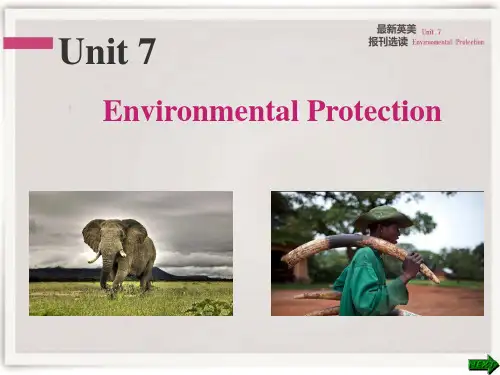
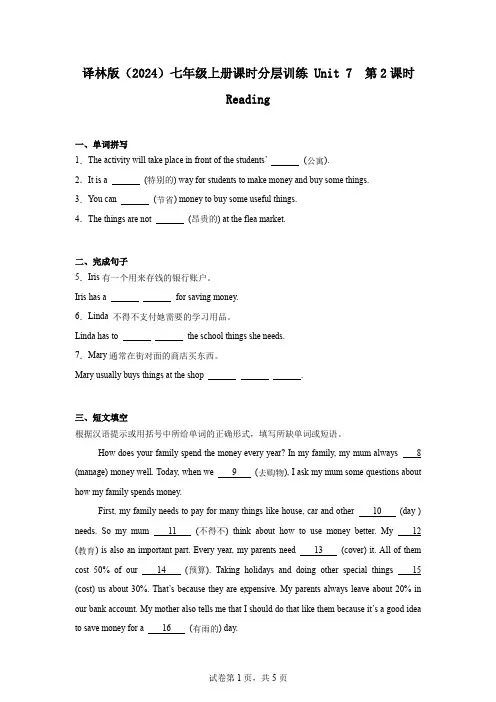
译林版(2024)七年级上册课时分层训练 Unit 7 第2课时Reading一、单词拼写1.The activity will take place in front of the students’ (公寓).2.It is a (特别的) way for students to make money and buy some things.3.You can (节省) money to buy some useful things.4.The things are not (昂贵的) at the flea market.二、完成句子5.Iris有一个用来存钱的银行账户。
Iris has a for saving money.6.Linda 不得不支付她需要的学习用品。
Linda has to the school things she needs.7.Mary通常在街对面的商店买东西。
Mary usually buys things at the shop .三、短文填空根据汉语提示或用括号中所给单词的正确形式,填写所缺单词或短语。
How does your family spend the money every year? In my family, my mum always 8 (manage) money well. Today, when we 9 (去购物), I ask my mum some questions about how my family spends money.First, my family needs to pay for many things like house, car and other 10 (day ) needs. So my mum 11 (不得不) think about how to use money better. My 12 (教育) is also an important part. Every year, my parents need 13 (cover) it. All of them cost 50% of our 14 (预算). Taking holidays and doing other special things 15 (cost) us about 30%. That’s because they are expensive. My parents always leave about 20% in our bank account. My mother also tells me that I should do that like them because it’s a good idea to save money for a 16 (有雨的) day.Money 17 (matter) in every family. I think everyone should plan how to manage his or her money.四、选词填空任务1:根据语篇内容,从方框中选择恰当的词(组),并用其正确形式填空。
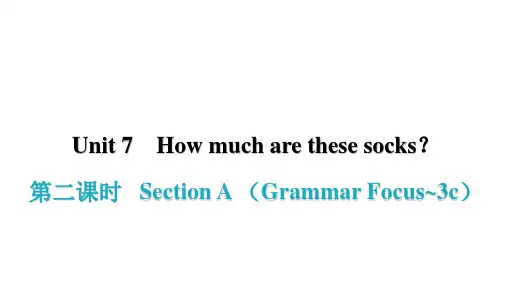
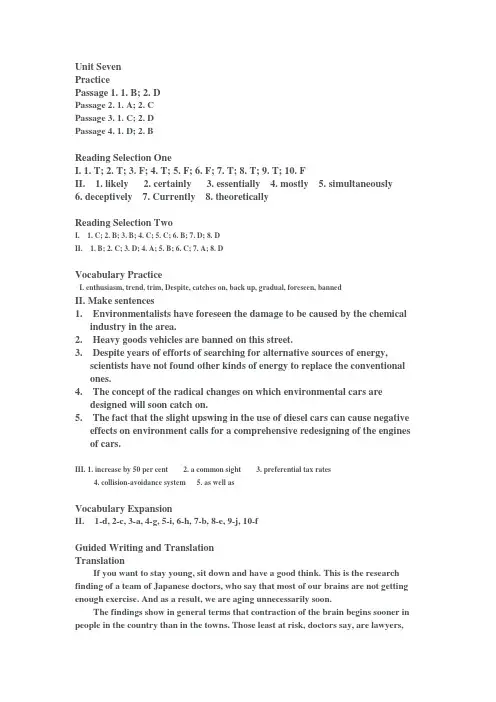
Unit SevenPracticePassage 1. 1. B; 2. DPassage 2. 1. A; 2. CPassage 3. 1. C; 2. DPassage 4. 1. D; 2. BReading Selection OneI. 1. T; 2. T; 3. F; 4. T; 5. F; 6. F; 7. T; 8. T; 9. T; 10. FII. 1. likely 2. certainly 3. essentially 4. mostly 5. simultaneously 6. deceptively 7. Currently 8. theoreticallyReading Selection TwoI. 1. C; 2. B; 3. B; 4. C; 5. C; 6. B; 7. D; 8. DII. 1. B; 2. C; 3. D; 4. A; 5. B; 6. C; 7. A; 8. DVocabulary PracticeI. enthusiasm, trend, trim, Despite, catches on, back up, gradual, foreseen, bannedII. Make sentences1.Environmentalists have foreseen the damage to be caused by the chemicalindustry in the area.2.Heavy goods vehicles are banned on this street.3.Despite years of efforts of searching for alternative sources of energy,scientists have not found other kinds of energy to replace the conventional ones.4.The concept of the radical changes on which environmental cars aredesigned will soon catch on.5.The fact that the slight upswing in the use of diesel cars can cause negativeeffects on environment calls for a comprehensive redesigning of the engines of cars.III. 1. increase by 50 per cent 2. a common sight 3. preferential tax rates4. collision-avoidance system5. as well asVocabulary ExpansionII.1-d, 2-c, 3-a, 4-g, 5-i, 6-h, 7-b, 8-e, 9-j, 10-fGuided Writing and TranslationTranslationIf you want to stay young, sit down and have a good think. This is the research finding of a team of Japanese doctors, who say that most of our brains are not getting enough exercise. And as a result, we are aging unnecessarily soon.The findings show in general terms that contraction of the brain begins sooner in people in the country than in the towns. Those least at risk, doctors say, are lawyers,followed by university professors and doctors. White collar workers doing routine work in government offices are, however, as likely to have shrinking brain as the farm worker, bus driver and shop assistant.Doc tors’ findings also show that thinking can prevent the brain from shrinking. Blood must circulate properly in the head to supply the fresh oxygen the brain cells need. “The best way to maintain good blood circulation is through using the brain”, they say, “Think hard and engage in conversation. Don’t rely on pocket calculators.”Part D: Literary AppreciationThe Catcher in the Rye1.By saying "you don't like anything that's happening", Phoebe means that Holden is angryabout the world but he doesn't know how to deal with the problems. He fails to win recognition from people around him and he himself regards the outside world as corrupted with phony people. Phoebe points out his problem and makes Holden more depressed.2.James Castle, Holden's schoolmate, was maltreated by six students in the same school andfinally jumped down from the window. The six students were not punished. Holden regards this as persecution of the corrupted and phony society over innocent youth. He becomes very depressed.3.Holden is extremely disappointed with the present situation, so he cannot find anything goodin the real life. All he can see around him is violence, cheating and corruption, so he can only cherish a dream.4.He thinks the adult world is disgusting with cheating and corruption. He hates it and is afraidof entering it, so finally he goes mad.5.Holden's dream is to be "a catcher in the rye, protecting innocent children from falling off thecliff". That is to protect the innocent children from the persecution of the corrupted adult world.6.Phoebe is innocent, clever, considerate and pretty. So he may be the ideal child Holden wantsto protect from the corruption of the adult world in his dream.7.Maybe not. It is related to the character traits of Holden. Besides, the outside world is sopowerful and overwhelming.8.Holden is described as a rebel of the modern world. He is sensitive enough to see all thecorruption, meaninglessness, hypocrisy of the society, but he can find no way to change the situation. So finally he is sent to a mental hospital.Unit SevenReading Selection One:Electric Tales –21st Century BooksBy Frank VizardIt may be the last book you'll ever buy. And certainly, from a practical standpoint,it will be the only book you'll ever need. No, it's not the Bibleor some New Age tome promising enlightenment—although itwould let you carry around both texts simultaneously. It's anelectronic book—a single volume that could contain a libraryof information or, if your tastes run toward what's current,every title on today's best-seller list.* And when you're done with those, you could refill it with new titles.TWhy an electronic book? Computers can store a ton of data and their laptop companions make all that information portable. True enough. But laptops and similar portable information devices require a lot of power—and heavy batteries—to keep their LCD screens operating. And LCDs are not easy to read in the bright light of the sun. TFact is, when it comes to portability, easy viewing, and low power requirements, it's hard to beat plain old paper.*TSo let's make the ink electronic.TThat's the deceptively simple premise behind a project currently coming to fruition at the Massachusetts Institute of Technology.* Some hurdles —mostly having to do with large-scale manufacturing—remain, so it will be a few years before you see an electronic book for sale in stores. But the basic technology already exists, developed at the Institute's Media Lab by a team led by physicist Joe Jacobson.T Simply put, each paper page in an electronic book is coated with millions ofmicroscopic particles encased in tiny capsules. Each of these microcapsules can respond independently to an electrical charge: Particles within the capsule moving to the rear appear dark while those moving toward the front look white. The direction in which the particles move depends upon whether a negative (dark) or positive (white) charge is applied. Each microcapsule is about 40 microns in size (that's a little less than half the thickness of a human hair).TThe number of microcapsules used on a given page is enormous. For instance, about 1, 000 microcapsules might be used to create the letter "A" on this page. "The smaller the size of the letter the more microcapsules you use," says Jacobson, "thereby improving resolution." The target is to have a "Paper display" with a resolution higher than that offered by today's computer screens. More than static letters is at stake. Theoretically, the microcapsules could be programmed to "flip" rapidly between dark and white state, providing, for example, a sense of motion in a diagram showing how a car works.TThanks to electronic ink, the book essentially typesets itself, receivinginstructions for each page via electronics housed in the spine. From a power standpoint, this process makes the electronic book very efficient. Unlike an LCD screen, which uses power all the time, energy is no longer needed to view the electronic book's pages once they are typeset. Only a small battery would be required, as opposed to the large ones needed to power laptop computers and their LCDs.*T Convenience, though, is still the main attraction—and that means more than simple portability.* Because the information is in electronic form, it can be easily manipulated. You could, for instance, make the type larger for easier reading. Or you could make notes in the margin with a stylus, your observations being stored on tiny, removable flash-memory cards in the spine.TIt's likely that electronic books will come pre-loaded with a selection of titles. New titles could be made available through flash-memory cards, for example. Jacobson, though, thinks the Internet will be the delivery method of choice. Imaginebrowsing through an online bookstore like and downloading a novel into your electronic book via the modem in its spine. Transmitting Moby Dick would take about a minute. You could download a few titles, so you'll have a few good reads to choose from while you're relaxing at the beach. If your first choice is not to your liking, a new title becomes available at the push of a button.*T Jacobson thinks an electronic book will be affordable—around $200 for a basic read-only model to about $400 for one that would record your margin scribbles. Some hurdles remain, though, before you can take an electronic book with you anywhere. Paper is produced in long sheets, and Jacobson is still working on the best method to integrate electronic ink into the process. To avoid having to use thousands of tiny wires on each page, the ink itself must be conductive. Such ink was recently demonstrated in the lab but has yet to be produced in volume. "Essentially," notes Jacobson, "we're trying to print chips." TJacobson is confident, however, that this can be done on a large scale. If Jacobson succeeds, he will have made the books for the 21st century. Tintrospection: 内省,反省cynical: 冷嘲热讽的tome: (一本)大书,一本巨著simultaneously: at the same timeLCD =Liquid crystal diode [display]: [无线电] 液晶二极管,液晶显示器hurdle: 障碍,困难microscopic: 极微的encase: 把…包在…内capsule: 囊状器; 囊状物static: 静止的,静态的at stake: in question; at risktypeset: 排字,排版manipulate: 使用,控制Unit SevenReading Selection Two:Cars of the Future Come under ScrutinyBy Graham HawkesDespite bitter opposition from environmentalists, the petrol-engined car is likely still to be king-of-the-road around the world in 20 years from now—and there will be millions more cars on the planet than there are now.TIn Britain alone, the car population will increase by more than 50 per cent overthe years to 2015, when there will be a total of 50 million vehicles on British roads. Increases in road traffic in countries such as China will be even more dramatic, as new mass markets develop.TElectric and gas-powered vehicles will become a reasonably common sight, particularly in big cities and among public service fleets, and car engines will be more efficient and cleaner than they are now.TMost cars will still be built from steel, although smaller and more efficient cars will be encouraged, probably through subsidies and preferential tax rates. Some cities will introduce smaller car parking bays on their streets and others may ban bigger cars altogether. Many inner-city areas will become off limits to all cars, and cities will probably increase dramatically the cost of parking within city limits.*T Many countries will ask car buyers to prove they have somewhere suitable to park their vehicle, and introduce "smart highway" systems to direct cars much as air traffic controllers now look after the flight of aeroplanes.THowever, despite a dramatic call from environmentalists for radical changes in the way cars are designed and built, a survey of international car manufactures by a British research company foresees a continuation of current trends—a move towards more efficient petrol-engined cars, a slight upswing in the use of diesel cars, and a gradual move to electric and gas-powered cars.TThe Warranty Holdings Group, a European leader in mechanical breakdown insurance and a researcher and commentator on trend in motoring, says that the motorists' world 20 years from now will be marked by more cars, more choice and more technology. Built-in safety features will increase and will include night-vision and collision-avoidance systems, and monitoring devices to stop drivers falling asleep at the wheel.TA growth in tele-working and home shopping should cut the numbers of trips in a car made by most motorists and "fun" sportscars will become more popular as private motoring becomes more recreational in nature.TThe survey results show that despite years of research into alternative fuel sources for vehicles, no clear winner has emerged for a replacement for the conventional petrol-engined car.* Gas and electricity are the best possibilities, with Toyota's design division in Japan claiming it already has an electric car that will driveup to 250km on a single charge.THowever, while electric and "hybrid" powered vehicles will be far more in evidence in the future, it will take a major technological break-through to steer the car industry away from its current path of gradual improvements to the petrol-driven internal combustion engine.TProfessor Garel Rhys, of the Cardiff Business School in Wales, is a leading commentator on the global motor industry. He says engine fuel injection systems of the future will be far more frugal than anything that exists at the moment. "It will be like putting a pipette of petrol into the cylinders, rather than just throwing it in by the bucket load, which is almost what we do at the moment when you compare it with what could be possible." TSome environmentalists point to the Twingo, the small car developed by France's Renault company, to show what could be achieved by the world's car industry if it moved away from a trend towards bigger and more powerful cars and radically cut the fuel consumption of its products. Public opinion polls in many countries show motorists wanting access to this kind of environmentally-aware car.*TA prototype environmental car, the SmILE (smaller, intelligent, lighter, efficient) has been put together by the environmental group Greenpeace. The group hopes the concept will catch on.* It depends heavily on supercharging or forcing fuel mixture into the cylinders at higher than normal pressure. Some experts say this is a good way to extract high performance and high fuel efficiency from small engines.T The adaptations to the Twingo don't end with the engine.* Changes to the bodywork and chassis have improved aerodynamics by 30 per cent in the wind tunnel. Special lightweight rims and tyres have improved rolling resistance by 35 per cent. More than 196kg of weight was trimmed off the Twingoby the smaller engine and a lighter radiator, battery andexhaust system, as well as by changes in construction ofthe seats, suspension, brakes and petrol tank. Greenpeacebelieves another 80kg could be trimmed from the car'sweight by a comprehensive rebuilding of the body of acar like Twingo, using fibre composites, without affectingthe vehicle's safety standards. While glass fibre andcarbon fibre reinforced plastic parts were used for the more aerodynamic body parts, the SmILE designers say they were built in such a way that using steel would make no difference to the total weight.TCutting the fuel consumption has had no negative effect on the handling or performance of the car,* according to the designers. Top speed, flexibility and acceleration from the engine is as good or better than the original Twingo. They say the technology used to create the Twingo SmILE could just as easily be used on other brands of car.TWhat remains to be seen is whether the enthusiasm of environmental designers catches on with the dollar-driven international car industry,* and whether motorists back up with their chequebooks their desire for "greener" cars.T。
![[能力提升]Unit7 How much are these sock?七年级上册英语(人教版)](https://uimg.taocdn.com/0d0bc152974bcf84b9d528ea81c758f5f61f29c1.webp)
Unit 7 How much are these socks? (Period 2)Section A (Grammar Focus-3c)Ⅰ.按要求完成句子。
1.The hat is 5 dollars.(对画线部分提问)________ ________ ________ the hat?2.We have black shoes.(改为否定句)We ________ ________ black shoes.3.The sweater is white.(对画线部分提问)________ ________ ________ the sweater?4.How much are these shorts?(对问题进行回答)________ ________ eight dollars.5.This skirt is blue.(改为复数形式)________ ________ ________ blue.Ⅰ.阅读理解。
Good morning! I’m Tom. I like white T-shirts. White is my favorite color. My dad David is in a white T-shirt and a pair of white shorts now. He likes white, too.Hello, my name is Huang Yi. My dad and mom call me Duoduo. Purple is my favorite color.I have three purple T-shirts, two purple skirts and one purple hat. My dad is Huang Gang. He always buys clothes for me in the store.Hi, I’m Bob. Blue is my favorite color. I have three pairs of blue sports shoes. I like playing basketball. I think it’s interesting. I always play basketball with my dad.6.What does Tom like?A.Black sweaters.B.Blue T-shirts.C.Purple hats.D.White T-shirts.7.What clothes is David in now?A.A blue sweater and a pair of white trousers.B.A white T-shirt and a pair of white shoes.C.A white T-shirt and a pair of white shorts.D.A purple T-shirt and a blue hat.8.Duoduo has ________ purple skirt(s).A.1B.2C.3D.49.What does Bob think of playing basketball?A.It’s easy.B.It’s difficult.C.It’s interesting.D.It’s boring. 10.Which of the following is TRUE?A.Tom likes purple.B.Duoduo’s father always buys fruit for her.C.Duoduo has three purple hats.D.Bob has three pairs of blue sports shoes.Ⅰ.任务型阅读。
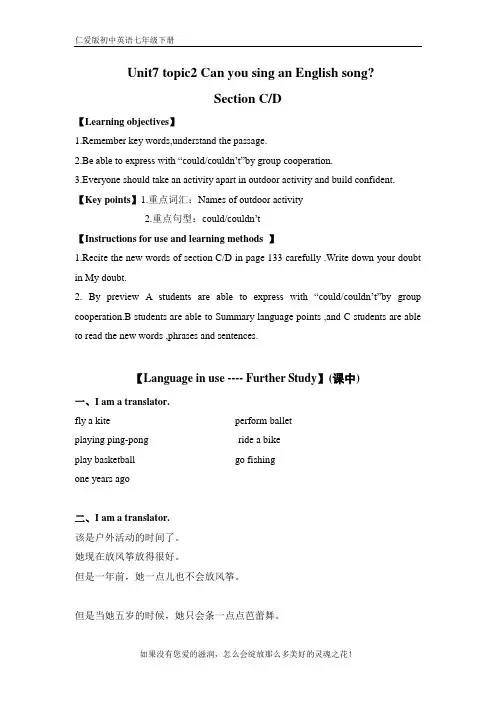
Unit7 topic2 Can you sing an English song?Section C/D【Learning objectives】1.Remember key words,understand the passage.2.Be able to express with “could/couldn’t”by group cooperation.3.Everyone should take an activity apart in outdoor activity and build confident. 【Key points】1.重点词汇:Names of outdoor activity2.重点句型:could/couldn’t【Instructions for use and learning methods 】1.Recite the new words of section C/D in page 133 carefully .Write down your doubt in My doubt.2. By preview A students are able to express with “could/couldn’t”by group cooperation.B students are able to Summary language points ,and C students are able to read the new words ,phrases and sentences.【Language in use ---- Further Study】(课中)一、I am a translator.fly a kite perform balletplaying ping-pong ride a bikeplay basketball go fishingone years ago二、I am a translator.该是户外活动的时间了。
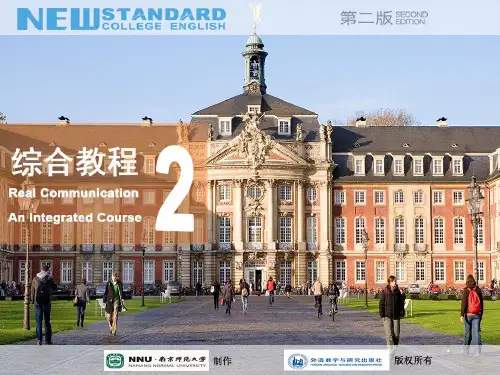
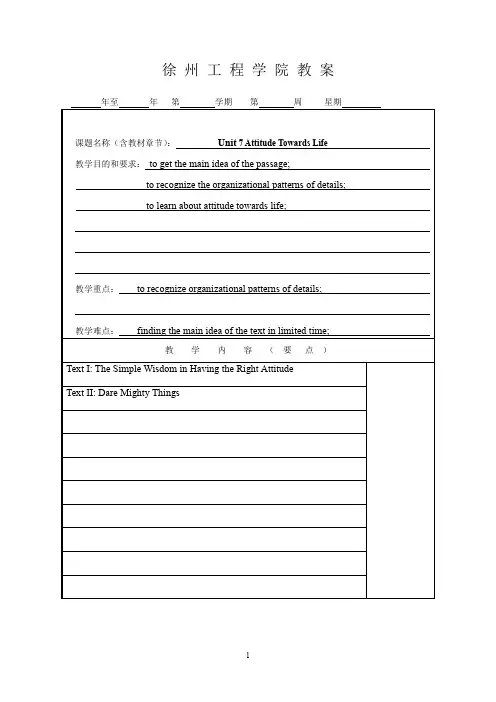
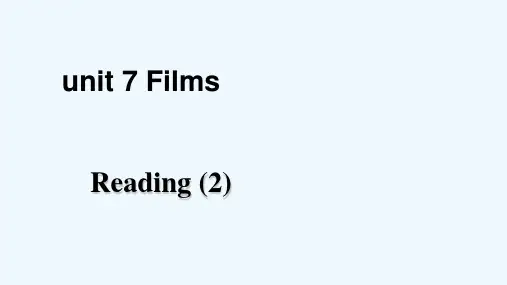
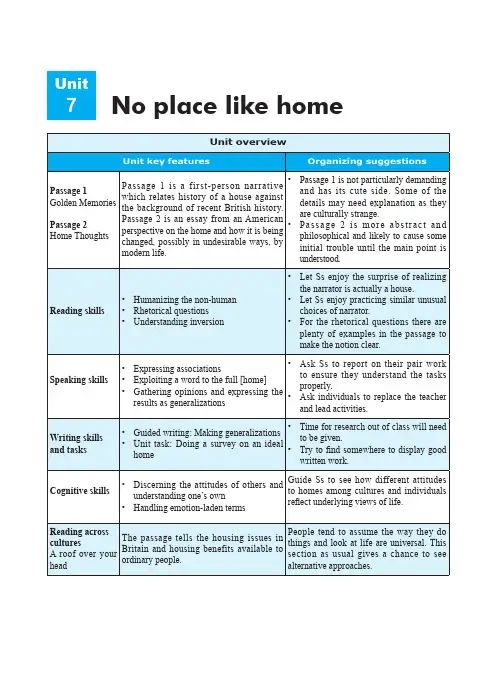
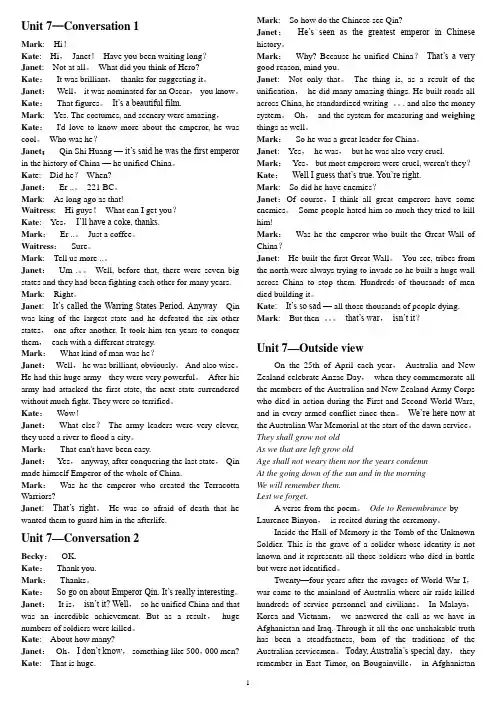
Unit 7—Conversation 1Mark: Hi!Kate: Hi,Janet!Have you been waiting long?Janet: Not at all。
What did you think of Hero?Kate:It was brilliant,thanks for suggesting it。
Janet:Well,it was nominated for an Oscar,you know。
Kate:That figures。
It’s a beautiful film.Mark: Yes. The costumes, and scenery were amazing,Kate:I'd love to know more about the emperor, he was cool。
Who was he?Janet:Qin Shi Huang —it’s said he was the first emperor in the history of China — he unified China。
Ka te: Did he?When?Janet:Er ..。
221 BC。
Mark: As long ago as that!Waitress: Hi guys!What can I get you?Kate: Yes,I’ll have a coke, thanks.Mark:Er ..。
Just a coffee。
Waitress:Sure。
Mark: Tell us more ..。
Janet:Um .。
Well, before that, there were seven big states and they had been fighting each other for many years. Mark: Right。
Janet: It’s called the Warring States Period. Anyway - Qin was king of the largest state and he defeated the six other states,one after another. It took him ten years to conquer them,each with a different strategy.Mark:What kind of man was he?Janet:Well,he was brilliant, obviously。
Because she was pleasantly surprised that female bosses are much more accessible to their employees and much more sensitive and intimate with their employees.Because there are still some people, both men and women, who report that they have a low tolerance for female bosses.Her working style is more flexible, understanding, willing to give power to others and seek consensus, and more team-oriented.Studies suggest that men are typically hierarchical, goal-oriented and feel entitled. Women, by contrast, manage diplomatically and share power.While women may feel more comfortable with a female boss, men often have to spend a long time making concessions to the new working styles.This example shows the conflicting male-female working styles, their entirely different ways of thinking, and their opposite attitudes toward the same situations.Because she thinks that it stems from the whole social context of traditional roles for men and women. Men are more authoritative than women, thus demanding more power than women.Though a few decades ago there were fewer female bosses in leading positions, women could now be perceived to work together with men to create the best management style.Men: strong, tough, stubborn, direct, hierarchical, distant, cold, impatient, rough, goal-oriented, rational, decisive, top-down.• Women: flexible, understanding, patient, detailed, warm, careful, considerate, indecisive, diplomatic, feeling-based, bottom-up.Men's: more direct and decisive.• Women's: more accessible and reasonable.Be nice and gentle.• Try best to accomplish assigned tasks.• Get her confirmation before taking any action.• Listen rather than speak.Be assertive but rational.• Be a good listener.• Compromise when necessary.• Be more patient and considerate.• Share thoughts and opinions.Will definitely play an indispensable role.• Will possibly outweigh men in leadership.• Will probably become tougher than before.• Will still face challenges and gender barriers. It was essential to (harness) science and technology, not just for the economy but for environmental protection as well.2. Language is the (symbolic) representation of a people, and it combinestheir historical and cultural backgrounds, as well as their approach to life.3. Because of the effective and helpful method, I was (disposed) to answerall the questions I could, and I never worried about making mistakes.4. It can be inferred from the passage that the commercial prosperityin Cambridge is due to hi-tech IT companies whose business has been (flourishing) .5. You will need to prove that the noise (violated) the regulations, thatyour neighbor was causing the noise, and that you attempted to have him stop.6. Most universities will guarantee your (accommodation) , at leastduring your first year, but you are likely to share a kitchen and bathroom with other students.7. We may (infer) from the report that hackers from outside of the companypresent a more serious threat to their security systems.8. She frowned at the business report, making an effort to (compose)herself before she talked to the employees at the upcoming meeting.9. A crucial factor is that one witness' evidence, though (plausible) ,may be rejected because it is contradicted by another witness whoseevidence is already proved correct.10. Windsor Middle School has been famous for zero (tolerance) to violenceand emphasis on respect for its students and rules.fatalhorizontalmechanicaloccasionalproportionallogicdenialcommercerelativityprioritycontinuity / continualactuality1. In (actuality) , it was the poor peasants and blue-collar workers whocomplained louder about and suffered more from the current tax policy.2. The purchase insurance covers (mechanical) breakdown for one year,which is stated in the insurance policy form.3. The salesperson's emotional state will influence the customer, andthe customer's buying decisions are first emotional and then arejustified with (logic) .4. I don't appreciate his reply as it was in part a(n) (denial) of thecriticism and in part an attempt to change the issue.5. (Occasional) gunshots can still be heard in the district though noone seems to know who fires the guns and if anyone is hit.6. The boss was undecided as to what to do since his decisions can havesevere and (fatal) consequences to all the employees and the company.7. Mike is well over 40 now and is much worried about how to maintain(continuity) between his youthful past and his middle-aged present.8. All notions about the well-known theory of (relativity) seem to havebeen coming from Einstein's general theory of relativity.9. Social fund officers are expected to give high (priority) to requestsfor loans for the repairs in public places like schools.10. With the increase of (commerce) in the 21st century, investment inmoney rather than in land has become the most convenient and popular form.11. The insurance fee charged by the company is directly (proportional)to the compensation its clients try to claim from their cases. 12. As construction progresses, workers check (horizontal) and verticallevels to ensure that both walls are exactly up to the designrequirements.It's obvious that women have come a long way as successful professionals. Women in the workplace are (1)(flourishing) as an increased number of women have made their presence felt in many industries and professions. The sector of the female workforce has (2)(expanded) with more and more strength and thus has its (3)(genuine) importance in the professional world.Whether they like it or not, men have to accept that women are marching up the management ladder confidently and (4)(diplomatically). Women usedto be much more "quiet and passive" due to the relatively small numberof female employees in (5)(comparison)to males. Women today, on the other hand, have begun seeking their (6)(administrative)positions by using all their powers of intelligence.Men are hierarchical and (7)(jealous) of the "beauty power" that allows women to get certain things based on their physical assets. Even though there is a(n) (8)(dispute) whether many professional females got into positions of power by using their appearance to their advantage, the (9)(valid)fact is the majority of women have worked hard to achieve their desired success.Women were considered as (10)(bystanders)in the workplace for many years and it was believed that the only jobs that they could handle were those of teachers or secretaries, but today's women can not only hold their own positions in the workplace, but they also have the dual task of raising their families.1. I surely know it's a good opportunity for us to invest in this housingproject, but it all (comes down to) money in the end; that is, how much money we can afford to invest.2. Many people (take exception to) this report because it may imply thatwomen generally have a weaker character and are less responsible for their behavior.3. There have been big strikes all over the country due to the recenttax reform, but the Prime Minister has made it clear that he won't (make concessions to) the strikers.4. What surprised me was that she stared at me for a moment and then (burstinto) laughter suddenly.5. He would never (feel at ease with) the French: He will never wear theright clothes, and he will never feel well on goose and red wine.6. Having expected that she would become the mistress of the householdand have much more freedom after her marriage, she was now disappointed (on both counts) .7. Carl (took over) the duties and responsibilities of his father inrunning a manufacturing factory from an early age.8. Bob was popular with local soccer fans, but his popularity also(stemmed from) the fact that he made or scored vital goals when they were needed.With a more progressive approach to diversity and a greater number of women being the leader of organizations, women today feel comfortable enough to use their natural management style at work. Their management style tends to be more communicative and relationship-oriented.One example of their management style is being more communicative. Women usually have greater verbal ability and verbal comprehension than men. Their speaking skill is actually innate – born with it. Since they are usually more supportive, more inclined to delegate responsibilities and more willing to foster the careers of their employees than their male counterparts, they communicate more efficiently. As a result, employees are happy to share ideas with their female boss and feel excited to have their voice heard in making decisions.Another example of women's natural management style is being more relationship-oriented. As we well understand, women are more emotionally and spiritually intelligent. This gives them the potential to be a more understanding boss than men. They know how to motivate their employees with human touches such as "get well" cards and "thank you" notes. They also know when to make concessions and accommodate their employees' personal needs because they are not as rigid and stubborn as male bosses. Employees, of course, enjoy such a relationship with their female boss. In brief, women's natural management style helps them succeed in their workplace. The fact that women are brought up to have verbal skills and emotional intelligence is a huge advantage. It's their strength and they need to use it more instead of disguising themselves.婚纱礼服的颜色和款式可取决于婚礼参与者的和文化。
Unit 7BehaviorWord Bankoutrageous: very shocking and unacceptable.令人震惊的/ 难以接受的; electric shock触电(terror->terrible->horror->horrible) abhor: v. to hate very much憎恶,讨厌; normal->abnormal [dress: (1)n. 连衣裙/ 长裙; (2) vt. dress<->undress->) address (discuss): v. to deal with处理(pathy=feeling) (a-: away) apathy (=indifference->indifferent冷漠的): n. lack of interest冷淡,无兴趣assign (->assignment=homework): v. to give as a share or duty分派,指派biology (->biological): n. the science that studies living organisms生物学board(->to ~ a plane/ a ship/ a bus; boarding card登机卡; ->boarder董事/房客->boarding school寄宿学校): n. an official body that has responsibility for a particular organization or activity 理事会,董事会(sequence: n.顺序->sequent: adj. 按序排列的) consequence: n. sth. that follows from an action or set of conditions; result后果,结果credit: n. a complete unit of a student's work that forms part of a course, esp. at a university学分/ 信用enlighten: v. t o cause to understand deeply and clearly启蒙,启发holler: v. to shout out呼喊[ID card= identity (card): n. 身份->identify: vt.) identical: adj. similar or the same相同的[machine机器-> machinery机械->mechanic机修工->mechanism机理/ 机制] mechanics: n. the ways in which sth. works, produces results, etc.方法,技巧mentor: n. a person who gives advice to another over a period of time, esp. to help them in their working, life导师pedagogy: n. the practice of teaching or the study of teaching methods教学法[perfect: (1)adj. 完美无缺的; (2)vt. =improve] perfectionist: n. a person who is not satisfied with anything that is not completely perfect完美主义者(plagiarism剽窃现象->) plagiarize: v. to take (words, ideas, etc.) from others' work (著作) and use them in one's own work without giving proper credit to the original author抄袭,剽窃police (policeman<->policewoman): (1)n.警察; (2)vt. to keep a watch on; control监督,控制routine: (1)adj. regular (regulate: vt. 调控); according to what is always habitually done惯常的,例行的; (2)n. 常规; routiner墨守成规者thrill (->thriller悬念片/ 恐怖片->action movie武打片): v. to have a sudden, strong feeling of excitement感到一阵激动Phrases and Expressionscome up with: to think of ; to produce想出,提出deprive sb. of sth.: to take sth. away from somebody剥夺(权利等)feel (be) obliged to: to feel it necessary to do觉得必要做prohibit sb. from doing sth.: to prevent somebody from doing sth.禁止; 阻止某人做某事take one's side: to support sb.; to agree with sb.站在……一边turn in (=hand in<->hand out发给学生作业的->handout 讲义): to hand in上交,交给Reading ComprehensionChoose the best for each of the following.1. In Para. 1 "had been plagiarized" probably means ( D )A. had cheatedB. had copied term papers from the Internet websitesC. had been copied by othersD. had been identified as cheating in term papers2. In Para. 4, "teacher apathy the norm" means ( C )A. teachers take interest in students' cheatingB. teachers show sympathy for students' cheatingC. teachers give a blind eye to students' cheatingD. teachers mind students' cheating3. The word "hit" in Para. 11 means ( C )A. attackB. strikeC. popular routineD. beat4. The tone in Para. 13 is ( A )A. jocularB. sarcasticC. encouragingD. discouraging5. Who are responsible for plagiarism at school, according to the passage? ( A )A. Professors.B. The Internet websites.C. Students themselves.D. Parents on their children's side.II. Complete the following summary of the text by filling in the blanks with words. The initial letter of each word has been given to you.Plagiarism is not a new thing. But with the development of the Internet technology, it has become more and more common. Where should the (1) penalty be placed (put), on the (2) cheaters, on the professors, or on the Internet? The answer is not as clear as (3) crystal (->crystallize). Beyond any (4) doubt, plagiarists ought to be punished. They need to do their own job and, at the same time, respect others. This is the basic (5) discipline (纪律) which they need to develop.What about the professors who show (6) apathy to cheating? They are (7) partly (partially部分地) (hold->) held responsible for the popularity (普及duty of passing knowledge (知识) to students, but also have the duty of cultivating the mentality (intelligence/ morality道德) of their students. If they were (8) apologists when (they are) dealing with students who plagiarize, how could plagiarism be controlled?The Internet websites seem to be to (9) blame, because the copied papers are mostly from the website (10) sources (来源->resources资源). But the purpose and function of websites are not to provide (convenient->) convenience (方便) for plagiarism. Instead (On the contrary), they are to make information much more easily accessible for people who can make proper use of (=use/ utilize使用) it. What's more, in the battle against plagiarism, haven't the websites played their role? VocabularyI. Choose the answer that best completes each sentence.1. We (lose->lost->lost) lost the election because of the ___C__ to our supporters.A. (anti-: against; anti-Japanese war抗日战争) antipathy (=indifference)B. (sym-: same) sympathy (n. 同情-> sympathize with sb. vt.)C. apathy (n. indifference冷漠)D. empathy (移情别恋)2. She is ___A__ with having saved the company from bankruptcy (prevent sb. from doing sth.阻止…发生).A. credited (记功)B. praisedC. promotedD. attributed (n./ vt. 属性, 品质, 特征, 加于, 归结于)3. I never __D___ in dealing with such matters.A. stand sidesB. be sidesC. stay sides (stay aside闪开)D. take sides (=support)4. You made the wrong decision, and now you must take the __B___.A. resultsB. consequences (后果)C. outcomeD. effect (n.->effective)5. Tom is not __D___ clever in the class.A. specifically (具体)B. specially特殊C. especiallyD. particularly特别提及6. Basic English is a ___C__ in the curriculum for the freshmen (大学一年级学生).A. class班级/阶级/等级B. lecture讲座C. course课程D. lesson一节课/ 教训; I’ll teach him a lesson教训某人.7. The airline has __B___ a novel [(1)n.小说; (2)adj. new] solution to the problem of jet-lag (时差反应).A. come up to (amount to=reach the number)B. come up with拿出C. (fade out昏迷<->) come to苏醒D. come on=go on继续8. Peter (think->) thought the world was flat until I __A___ him.A. enlightened (启发)B. lightened (vt. 减轻, 照亮)C. (light-> lighted/ lit->lit) lightedD. delighted=happy干涉, 干预, 妨碍, 打扰) interfering.A. forcedB. pleasant D. respected10. Writing a [cheque (英) =check (美) is quite a simple __A___.A. procedure (程序)B. process (n.过程/工艺/vt.加工; processed food)C. move (vi.移动; n. 动作)D. action (重大军事行动)II. Fill in the blanks with the words or phrases given below. Change the form where necessary. thrill turn in quit routine identicalpenalty series faculty address sensitivementor database sinister tempt bargain1. This is a very tempting (=attractive) offer (n. /vt.) and I suggest you give it a consideration. [suggest sth./ doing sth./ that sb. do sth. #suggest sb. to do sth. (错误)]2. He ignored the side issues (side effect副作用) and addressed (dedicated oneself to sth.献身于…事业) himself to the main (major) problem.3. His term paper is identical (=same) to (介词) one thesis I've read on the Internet.4. What a thrilling (=exciting) game; the winner was in doubt (n.是个悬念) until the last minute.5. The soldiers have to turn in (=hand in递交) their guns (枪/炮) when they leave the army.6. She longed to (desire渴望) escape from the (stupid愚蠢的->) stultifying (vt.使显得愚笨, 使变无效, 使成为徒劳) routine of (homework家庭作业) housework (家务劳动).7. She had had enough and quit (=stop) working in the company.8. The patient [(1)n.病人(2)adj.有耐心的] is very sensitive (敏感) to pain.9. The increasing demand [(1)vt.要求; (2)n.需求] has given the company greater bargaining (讨价还价的) power.10. All faculty (一个机构的全体工作人员) members are required to attend the meeting. [(1) vt. attend a class/ meeting; (2)vi. to attend to sb.-> attendant服务员; flight attendant空勤人员] TranslationPut the following paragraph into Chinese.Plagiarists as victims. Teachers as oppressors. It's not your conventional reaction to cheating. Not surprisingly, it has been a hit with many college students, just as it was with the plagiarists at Piper High. The student newspaper at Stanford ran an editorial attacking the use of antiplagiarism software as a potential violation of the school's honor code, which "prohibits professors from taking 'unusual and unreasonable precautions' in their academic procedures." Moreover, the paper said, checking for cheating "might even harm the relationship between students and faculty."参考译文:抄袭者成为了受害者,老师们成了压迫者。
Module 2 ChangesUnit 7 Travelling in Garden CityPart 2 Vocabulary and Grammar(第二部分词汇和语法)(共40分)I. Choose the best answer(选择最恰当的答案):(共15分)()1. Travelling _____air is very convenient and quick.A.withB.onC.byD.to()2. Making models is outdoor activity. I like it very much.A.anB.aC.theD./()3. I am hungry. Please give _____a piece of cake.A.mineB.myC.meD.our()4. The class is over. All the students put the books _____their bags.A.atB.inC.onD.from( ) 5. There 's _____juice and _____cakes on the table . Let's go and buy some.A. a little;a fewB. a little; a littleC. little;fewD. little; a few()6. _____of the twins are interested in music.A.NoneB. BothC. AllD. Some()7. There _____no traffic in the city in the past..A.wereB. wasC. areD. is()8. In summer more people like to study in _____rooms.A. air-conditionerB. air-conditionC. air-conditionedD. air-conditioners()9. Nowadays passengers on the bus put their money in a fare box_____A.eitherB. tooC. yetD. instead()10.——Must I finish writing the composition this afternoon?—No, you_____. You may finish it in the evening.A. doesn’tB. mustn’tC. can’tD. needn’t()11. We must stop______ the water, the land and the air.A. polluteB. to polluteC. pollutingD. to polluting()12. Perhaps people will travel by spaceship in the future. The underlined word means ______.A. may beB. mayC. possibleD. possibly()13. Danny does well in cycling. The underlined part means “______”.A. be good atB. are good atC. is good atD. was good at()14. — Must we start right now?—________You can leave at 8:00.A. Yes, you must.B. No,you mustn’t.C. Pm afraid you must.D. No,you needn’t.()15. 一May I speak to Linda?---____________A. No, you may not.B. Speaking. Who are you?C. This is Linda. Who is that?D. I’m Linda.II. Complete the sentences with the given words in their proper forms (用括号内所给单词的适当形式完成下列句子):(共6分)1.It is _____for us to swim in the deep river, (danger)2.Ken’s mother was a_____ ten years ago. (conduct)3.The policeman asked the old man,“Why do you look so_____?" (worry)4.We shall go to Hong Kong during the Spring Festival. (travel)5.Perhaps there will be_____ air pollution in the future than now. (little)6.I’d like to buy the red shorts. I don't want the blue_____. (one)7.People mustn’t_____the street when the traffic lights are red. (crossing)8.What do you _____do at weekends? (usual)9.I enjoy_____in the countryside, (cycle)10.There are _____students in our class than in your class, (few)I. Rewrite the following sentences as required(根据所给要求,改写下列句子。
英语初一下仁爱湘教版英语:unit7topic2练习Topic2CanyoudanceordrawSectionA课课练【一】依照句意和首字母提示补全单词。
1.Icans______ChinesesongsandEnglishsongs.2.Canyoud_____thedisco?3.Mariacanp______balletandWaltz.4.ZhangDanandZhangHaocans______verywell.5.Janewantsto________(弹)theguitarattheparty.【二】用适当的介词填空。
1.Iwillplaythepiano_____theparty.2.WhynotsingEnglishsongs_____me?3.IcansingChinesesong,what______you?4.Theyareswimming______theriver.5.Jimisdrawingapicture_____me.【三】单项选择:〔〕1.LiLei_____playtheguitar.A.canB.isC.amD.are〔〕2.–Canyoudance? --________.A.Yes,Ican’tB.No,IcanC.Yes,IcanD.No,Iam〔〕3.–Icanplaythepiano.--________.A.I,tooB.Me,tooC.IcanD.I,can〔〕4.____yousingEnglishsongs?A.AreB.DoC.DoesD.Can〔〕5.Whatwillyouperform____herbirthdayparty?A.atB.inC.onD.with〔〕6.--Wouldyouliketocometomybirthdayparty?–Yes,_____________A.Yes,IwouldB.No,Iwouldn’tC.IwouldlovetoD.Iwouldlove.〔〕7.I______singsomeEnglishsongs.A.canonlyB.onlycanC.canonlytoD.onlycanto〔〕8.Thelittlegirlcan’t________.A.playpianoB.playpianosC.playthepianoD.playapiano 〔〕9.–CanIhavealookatthesoccerball?-_________A.Yes,IhaveB.No,Ihaven’tC.No,youcan’tD.No,Ican’t 〔〕10.LittleTomcan_____abike.A.byB.onC.rideD.in【四】句型转换。
How to Tell If Someone Is Lying to you?By Garrett AndersonReading time:10 minutes1、Deception undermines(损害)friendships, family relations, and business acquaintances. A lie has a ripper effect , hurting not just the person lied to, but everyone surrounding the liar. Though it is not easy to tell the truth, ultimately honesty is less troublesome than lying. Being able to recognize when someone is lying is an important skill.2、About a quarter century ago, my introduction into the world of deception came with a book by Paul Ekman , Telling Lies. This was followed by hundreds of hours of training by some of the best “lie-catchers”in the business which included all forms of nonverbal behavior. Nonverbal behavior is in fact far more reliable than anything that pours out in speech. I put this knowledge to work everyday for many years and it allowed me to become quite successful. But it came with personal cost.3、Practiced and well rehearsed deception, and the ability to detect that very deception ,are true art forms. Liars are far more successful than anyone who cares to guess. Your ability to detect deception depends almost entirely on your willingness to go to great lengths to school yourself. Absent from extensive training and the ability to practice those skills daily on a variety of people, most people have little ability toaccurately“read”and detect liars. You are not born with the ability, nor have I met someone so inherently intelligent that they could immediately spot deceptive behavior. Most folks come to this battle uneducated and therefore, unarmed.4、Excellent liars are almost undetectable. If a would-be liars knows their target well, they can construct a believable story specially made up for him. If you are the target, it is very important to listen carefully but discount virtually everything that is said. If that sounds contradictory, it’s not.5、There are two ways to detect deceptive behavior. Deceptive people spin yarns, and when they do so, they leave out details. Listen intently and never interrupt them. They will be as vague and non-specific as possible when telling a story. They will leave out significant details. As we listen to the story intently, we look for patterns of nonverbal behavior in clusters: covering the mouth, looking away, uneasiness and shifting, crossing legs and arms, hostile behavior. Evasive answers to question that are specific. Micro gestures are revealed, particularly those involving the eyes and forehead. Seen independently, any of these gestures by themselves are less significant. Viewed as a whole, or seen in clusters, they become very indicative of deceptive behavior.6、The bigger the“stakes,”the more difficult it is for liars to achieve their goals. They are under stress. Liars are entirely focused on not beingdetected or exposed. A liar’s ability to succeed is entirely dependent on the intelligence and emotional needs and beliefs of the target, the overall and convincing delivery of the lie, and the targe t’s ability or inability to dissect(仔细分析)and comprehend what was just said to them.7、Excellent lie-catchers are great listeners. Excellent lie-catchers will repeat a story back and ask for every specific detail. For instance, if your husband says he has been to a football game and you suspect otherwise, don’t settle for that explan ation. Ask how much the ticket cost, where he sat or what type of seating he was in, what the half time score was, who won the game and the final score. Perhaps you may ask whom he attended the game with and whom he saw there. Ask him if he ate at the game, what he ate, and how much it cost. Think of everything you generally do at a game and ask for specific details. This detail-oriented line of questioning cannot be rehearsed entirely and is applicable to almost virtually every type of scenario or alibi(借口、托词)offered by a deceptive person. They are relying on your reluctance to question them. Hesitant answers, delays and stalling tactics, memory loss, or clusters of deceptive or hostile behavior may or may not be evident as you ask relevant questions.8、Successful lie-catching comes with serious caveats(告诫). First and foremost, it might not be in your best interest to let your ego run away with a line of questioning. If a perceived deceptive person isactually telling the truth, you will do serious harm to your relationship with that person. You will do harm and render some embarrassment if you catch them lying. You also run the risk of misinterpreting what you have heard or seen. On the plus side, you will be serving notice that you will no longer be accepting vague and rehearsed stories without verifying details. Liars will be reluctant to unload a yarn with you as a target if they think the story will be scrutinized(仔细检查). One other caveat; if you catch liars for a living, try not to practice this in your person life. It can cause a great deal of harm.9、One last word of caution is in order here. Well trained and expert “lie catchers”master the craft and can spot liars far sooner than virtually anyone else. Friends and peers of excellent“lie catchers”will tend to think that those few who can immediately spot lies are rash, judgmental, and prone to jumping to conclusions. The skilled masters of detecting deception, even when proven right, will take no victory from peers who simply don’t understand how they arrived at an accurate conclusion so quickly.10、The art of catching deceptive people is a learned and acquired skill. It is a far bigger universe than the one I can describe here. It should not be practiced by those that simple don’t know what they are doing. Common sense works fine for most folks. If you are planning a career that involves uncovering deceptive behavior then you should know whatyou are getting yourself into and find the appropriate levels of education that will allow you to succeed.ExercisesI.Go over the passage quickly and decide whether thefollowing statements agree or not with the informationin the passage.MarkY(for YES)if the statement agrees with the information given in the passage;N(for NO)if the statement contradicts the information given in the passage;NG(for NOT GIVEN)if the information is not given in the passage._______1、I was introduced into the world of deception by abook entitled Telling Lies._______2、I became very successful after I put my knowledgeabout deception into daily practice._______3、A person is born with some inherent talent to detectdeceptive behavior._______4、Good liars usually use all kinds of micro gestures intheir story-telling._______5、A liars success entirely depends on his/her owndeceiving intelligence and emotional qualities._______6、Detail-oriented questioning can be rehearsedentirely before application._______7、Misinterpreting an honest person as a liar may causeserious harm to your relationship with that person. Complete the following sentences with the information given inthe passage.8、On the positive side, lie-catchers may give the liar a noticethat_______ stories will no longer be accepted withoutverified details.9、_______“lie catchers”can master the lie-catching skills muchquicker than almost anyone else.10、As a_______ skill, the art of catching deceptive people is a bigissue that can not be covered within a few pages.答案:I. 1. Y 2. Y 3. N 4. NG 5. N 6. N 7. Y8、vague and rehearsed9、Well-trained and expert10、learned and acquired。